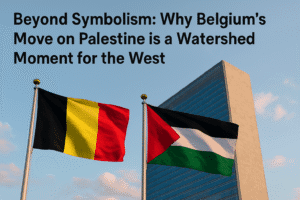Beyond Symbolism: Why Belgium’s Move on Palestine is a Watershed Moment for the West
In a significant diplomatic shift, Belgium has pledged to formally recognize Palestinian statehood at the upcoming UN General Assembly, aligning itself with other key Western allies like France and the UK. This move goes beyond symbolism, as it is coupled with a concrete package of 12 sanctions targeting Israeli settlement goods and public contracts. The decision is a direct response to the humanitarian crisis in Gaza, settlement expansion, and violations of international law.
It signals a profound erosion of the long-standing Western consensus that has historically supported Israel, revealing a growing transatlantic divide as the US condemns such recognition. This top-down approach represents a new strategy to create conditions for a two-state solution, as direct negotiations have failed. Consequently, the move strengthens Palestine’s diplomatic leverage while simultaneously increasing the political and economic pressure on Israel, potentially accelerating a major realignment in Middle East diplomacy.

Beyond Symbolism: Why Belgium’s Move on Palestine is a Watershed Moment for the West
In the hallowed halls of the United Nations, a simple act—the raising of a flag—can signal a seismic shift in global politics. This September, that act will be repeated diplomatically as Belgium announces its formal recognition of Palestinian statehood at the UN General Assembly. But this is far more than a symbolic gesture. It’s a stark indicator of a crumbling Western consensus and a new, more consequential phase of international pressure on Israel.
Belgium is not acting in a vacuum. Its decision places it alongside other traditional Western allies of Israel—including France, Canada, Australia, and the UK—who have recently made similar pledges. This collective pivot isn’t merely a coordinated diplomatic statement; it’s a response to a profound rupture in the traditional transatlantic approach to the Israeli-Palestinian conflict.
The Substance Behind the Statement
While headlines focus on recognition, the true weight of Belgium’s announcement lies in its accompanying package of 12 sanctions. These are not vague condemnations but targeted economic and political measures:
- A Ban on Settlement Goods: Prohibiting imports from illegal Israeli settlements in the West Bank directly targets the economic engine of the occupation, moving beyond principle to practice.
- Revised Procurement Rules: A review of public contracts with Israeli companies could have significant financial repercussions, forcing a reevaluation of business engagements that may be linked to contested territories.
- Travel Bans on Hamas Figures: This clause is crucial, demonstrating that this is not a blanket anti-Israel move but a targeted effort aimed at both sides of the conflict, albeit asymmetrically.
The Belgian government explicitly tied these actions to the ongoing humanitarian crisis in Gaza, the relentless expansion of settlements, and repeated violations of international law. This framing positions the move not as an attack on Israel’s right to exist, but as a defense of a rules-based international order that it believes Israel is flouting.
Why This Moment is Different
For decades, the path to Palestinian statehood was envisioned as the final prize of a successful negotiation process brokered primarily by the United States. That paradigm has effectively collapsed. What we are witnessing now is the emergence of a parallel track: a top-down, international effort to create the conditions for a two-state solution through recognition and pressure, precisely because the bottom-up negotiation track has failed.
This represents a fundamental break from the past. Key Israeli allies are no longer willing to indefinitely subsidize the status quo with unwavering diplomatic cover. The erosion of this support signals a deep and growing frustration with Israel’s current leadership and its policies.
The Growing Transatlantic Divide
Perhaps the most striking consequence is the clear rift it exposes between the United States and its European partners. As the U.S. administration reportedly works to block Palestinian President Mahmoud Abbas from even attending the same UN summit, its closest cultural and political allies are moving in the opposite direction.
This creates a new, uncomfortable dynamic: the U.S. and Israel are becoming increasingly isolated on the world stage, while European nations, often in concert with Arab states like Saudi Arabia, are forging a independent diplomatic path. This divergence threatens to weaken unified Western influence in the region and could have lasting implications for NATO cohesion on non-European issues.
The Ripple Effects: What to Expect Next
The implications of this shift are vast and uncertain:
- In Israel: The government may interpret this not as a reason for compromise, but as a provocation. There is a real risk of accelerated annexation plans in the West Bank as a defiant retaliation, further entrenching the conflict.
- In the European Union: Deep internal divisions will likely intensify. While nations like Belgium, Ireland, and Spain push for a harder line, others like Germany and Hungary may resist, paralyzing the EU’s ability to form a unified foreign policy on the issue.
- For the Palestinian Authority: While a major diplomatic victory, recognition does little to solve the PA’s internal problems of legitimacy, governance, and the rift with Hamas. The danger is that it creates a “state” on paper while conditions on the ground deteriorate further.
- For the World: This marks a definitive move towards a multipolar approach to the conflict. With the U.S. monopoly on peacemaking fading, a broader, more disparate group of nations will now shape the process, for better or worse.
In the end, Belgium’s decision is a powerful testament to a changing world. It proves that international patience has limits and that moral outrage, when coupled with sustained political action, can rewrite the diplomatic playbook. The recognition of Palestine is no longer a distant dream for activists; it is a active, unfolding project of Western foreign policy. The gates are opening, and the landscape of the Middle East is about to be reshaped.
You must be logged in to post a comment.